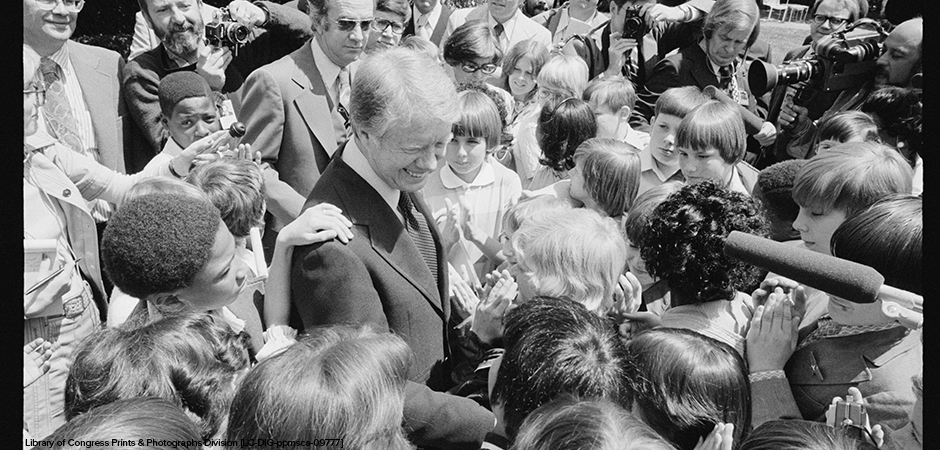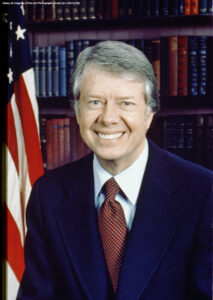
Jimmy Carter, the 39th president of the United States, passed away on December 29, 2024, at the age of 100. Aside from being the longest-living president in history, Carter also was known for his service, his faith, and his commitment to the environment and social justice. After his death, Carter was honored with more than a week of public tributes. Here, btw takes a closer look at President Carter’s lifetime of service.
Early Life
Jimmy Carter was born in Plains, Georgia, in 1924. He graduated from the Naval Academy in 1946 and served as a naval officer for seven years. After that, Carter returned to Plains. Together with his wife, Rosalynn, he had three sons and one daughter. He was also a devout Baptist, and his faith shaped both his personal life and political career.
In 1962, Carter entered state politics, and eight years later was elected governor of Georgia. As governor he worked to simplify the state’s governing bureaucracy and reduced the number of state agencies to help save the state money. Carter’s political commitment to ecology and racial justice made him stand out among other Southern politicians of this time period. In 1976, on a campaign of simplicity and honesty in government, he beat incumbent Gerald Ford and became the 39th president of the United States.
A Challenging Presidency

As president, Carter faced many domestic and foreign challenges. His administration battled economic issues such as rising energy costs, inflation, and high unemployment. The Carter administration created nearly eight million jobs and managed to reduce the federal deficit. His administration was also responsible for creating the Federal Emergency Management Agency (FEMA), and a national energy policy to help with the oil shortages and the energy crisis of the 1970s. He also greatly expanded the national park system and created the Department of Education. But high inflation continued to plague the United States throughout his presidency.
Carter’s administration had many foreign policy successes as well. In 1978, he orchestrated the Camp David Accords, a key peace agreement between Israel and Egypt. To improve tense relations with Panama, he set a date for ending U.S. control of the Panama Canal.
Building on the diplomatic work of Presidents Nixon and Ford, he also established full diplomatic relations with the People’s Republic of China and negotiated an important nuclear treaty with the Soviet Union. Carter’s achievements in foreign policy were overshadowed however by the Iran hostage crisis. In 1979 a revolution erupted in Iran that overthrew the Shah (the king) of Iran and replaced his government with an an Islamic fundamentalist state, Armed Iranian students who supported the revolution stormed the American Embassy in Iran and took fifty-two American staff members hostage for more than a year. Carter’s inability to negotiate an end to the crisis –along with Americans’ frustration with ongoing inflation, cost him his reelection. He lost to Republican Ronald Reagan in 1980.
A Great Former President
Many American journalists and historians believe Carter was the nation’s greatest former president.
After losing to Reagan in 1980, Carter continued his life of service. In 1982, he and his wife Rosalynn founded the Carter Center, a global humanitarian operation dedicated to issues relating to democracy and human rights. He was also active with Habitat for Humanity, building homes for less privileged people. Hebecame a high-profile face of that organization. In addition to all of this, he also regularly taught Sunday school in his hometown, served as a political advisor in key foreign disputes, and wrote several books.
In 2002, he was awarded the Nobel Peace Prize for his ongoing efforts to advance peace and democracy, and for his ongoing work for social justice.
Honoring His Legacy
After Carter’s death, his casket was placed in the U.S. Capitol Rotunda for two days so that politicians and the public could pay their respects: a process called “lying in state.”
His state funeral was held at the Washington National Cathedral on January 9, 2025, which President Biden declared a National Day of Mourning. The service lasted about two hours and was attended by all five currently living president, as well as Carter’s family and friends. A eulogy was given by President Biden, Carter’s friend of almost fifty years. Carter’s two grandsons also delivered eulogies, speaking about their grandfather’s commitment to serving others.
President Carter’s remains were then transported back to his hometown of Plains, Georgia, for a private funeral ceremony and burial. All U.S. flags at government buildings will be flown at half-staff until sunset on January 28, 2025, marking thirty days of mourning after the former president’s death.
